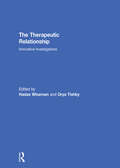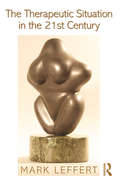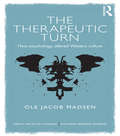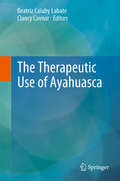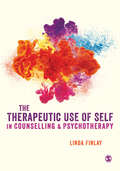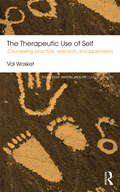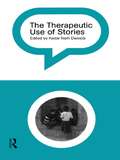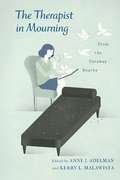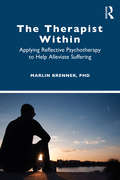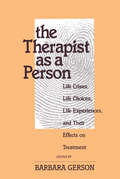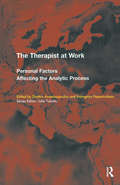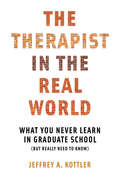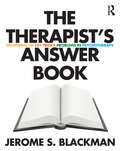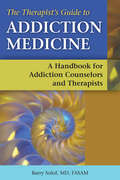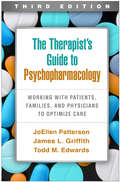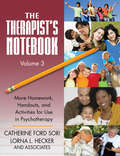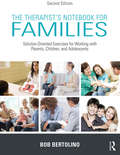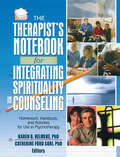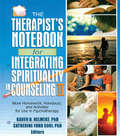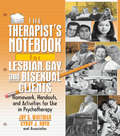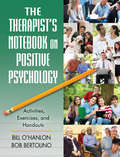- Table View
- List View
The Therapeutic Relationship: Innovative Investigations
by Hadas Wiseman and Orya TishbyThe therapeutic relationship has been recognized by psychotherapy researchers and clinicians alike as playing a central role in the process and outcome of psychotherapy. This book presents innovative investigations of the therapeutic relationship focusing on various relationship mechanisms as they relate to changing processes and outcomes. A variety of perspectives on the therapeutic relationship are provided through different research methods, including quantitative and qualitative methods, and divergence in psychotherapy orientations, including psychodynamic, interpersonal, cognitive-behavioural therapy, emotion-focused process experiential therapy, narrative therapy, and attachment-based family therapy. The chapters, written by leading psychotherapy researchers, present cutting-edge empirical studies that apply innovative methods in order to: study process-outcome links; explore in session processes that address the question of how the therapeutic relationship heals; examine the contributions of clients and therapists to the therapeutic relationship; and suggest practical implications for training therapists in psychotherapy relationships that work. Research on the therapeutic relationship has been identified as a natural arena for bridging the gap between research and clinical practice, and will be of particular interest to practicing clinicians. This book was originally published as a special issue of Psychotherapy Research.
The Therapeutic Situation in the 21st Century
by Mark LeffertExtending the themes of Contemporary Psychoanalytic Foundations, The Therapeutic Situation in the 21st Century is a systematic reformulation of fundamental psychoanalytic concepts, such as transference, therapeutic action, and the uses of psychotropic drugs, in the light of recent developments in postmodernism, complexity theory, and neuroscience. Leffert offers formulations of areas not previously considered in any depth by psychoanalysts, such as power relations in the analytic couple, social matrix theory, and narrative theory informed by considerations of archaeology, genealogy, complexity, memory, and recall. He also considers new areas, such as the role of uncertainty and love in the therapeutic situation. This book is part of an ongoing effort to place psychoanalysis in the current century, and looks to outside as well as inside areas of thought to inform how we work and how we think about our work.
The Therapeutic Turn: How psychology altered Western culture (Concepts for Critical Psychology)
by Ole Jacob MadsenIn what ways has psychology become more influential in Western society? In this book author Ole Jacob Madsen considers the notion of a ‘Therapeutic Turn’ in Western culture – the tendency for psychology to permeate ever new spheres within society. The Therapeutic Turn evaluates the increasing prevalence of psychology in several areas of Western society: Western consumer culture, contemporary Christianity, self-help, sport and politics. Madsen proposes that there are problematic aspects to this development which are seldom recognised due to a widely held assumption that ‘the more psychology, the better for everyone’. A recurring concern with psychological solutions is that they often provide individual solutions to structural problems. As a result, psychologists may be inadvertently increasing the burden on the shoulders of the people they are meant to help and, at the same time, our capacity to understand individual suffering in the light of major historical and political changes in society is becoming increasingly clouded. The Therapeutic Turn presents an accessible and engaging critique of the influence of psychology within Western society. It will appeal to a broad audience of students, academics and lay readers interested in this aspect of modernity and contemporary society, and it will also be of great interest to practitioners and therapists.
The Therapeutic Use of Ayahuasca
by Beatriz Caiuby Labate Clancy CavnarThis book presents a series of perspectives on the therapeutic potential of the ritual and clinical use of the Amazonian hallucinogenic brew ayahuasca in the treatment and management of various diseases and ailments, especially its role in psychological well-being and substance dependence. Biomedical and anthropological data on the use of ayahuasca for treating depression, PTSD, and substance dependence in different settings, such as indigenous contexts, neo-shamanic rituals, contemporary therapeutic circles, and in ayahuasca religions, in both South and North America, are presented and critiqued. Though multiple anecdotal reports on the therapeutic use of ayahuasca exist, there has been no systematic and dense reflection on the topic thus far. The book brings the therapeutic use of ayahuasca to a new level of public examination and academic debate. The texts in this volume stimulate discussion on methodological, ethical, and political aspects of research and will enhance the development of this emergent field of studies.
The Therapeutic Use of Ayahuasca
by Beatriz Caiuby Labate Clancy CavnarThis book presents a series of perspectives on the therapeutic potential of the ritual and clinical use of the Amazonian hallucinogenic brew ayahuasca in the treatment and management of various diseases and ailments, especially its role in psychological well-being and substance dependence. Biomedical and anthropological data on the use of ayahuasca for treating depression, PTSD, and substance dependence in different settings, such as indigenous contexts, neo-shamanic rituals, contemporary therapeutic circles, and in ayahuasca religions, in both South and North America, are presented and critiqued. Though multiple anecdotal reports on the therapeutic use of ayahuasca exist, there has been no systematic and dense reflection on the topic thus far. The book brings the therapeutic use of ayahuasca to a new level of public examination and academic debate. The texts in this volume stimulate discussion on methodological, ethical, and political aspects of research and will enhance the development of this emergent field of studies.
The Therapeutic Use of Self in Counselling and Psychotherapy
by Linda FinlayThis book examines the ‘therapeutic use of self’, and the intertwining of the therapist’s professional self and their personal self. Combining practical illustrations and case studies with theory and research, the book explores a number of questions, such as: · What are our personal values and attitudes and how do these manifest in our work with clients? · How do we interact with and impact others, and in what ways might this help or hinder our therapeutic work? · What might we represent to the client as a result of our particular social background, and how might this impact on the power dynamics within client relationships? Learning features include Practical Applications, Research boxes, Case Examples, Critical Reflections, Discussion Questions and Further Reading. This is a must-read for any students studying professional practice, counselling process, ethics, skills, working online/remotely, the therapeutic relationship, and more.
The Therapeutic Use of Self in Counselling and Psychotherapy
by Linda FinlayThis book examines the ‘therapeutic use of self’, and the intertwining of the therapist’s professional self and their personal self. Combining practical illustrations and case studies with theory and research, the book explores a number of questions, such as: · What are our personal values and attitudes and how do these manifest in our work with clients? · How do we interact with and impact others, and in what ways might this help or hinder our therapeutic work? · What might we represent to the client as a result of our particular social background, and how might this impact on the power dynamics within client relationships? Learning features include Practical Applications, Research boxes, Case Examples, Critical Reflections, Discussion Questions and Further Reading. This is a must-read for any students studying professional practice, counselling process, ethics, skills, working online/remotely, the therapeutic relationship, and more.
The Therapeutic Use of Self: Counselling practice, research and supervision (Routledge Mental Health Classic Editions)
by Val WosketThe Therapeutic Use of Self has continued, since its publication in 1999, to be considered a key text within integrative, humanistic and relational approaches for the training and development of therapists in the UK and abroad. This long-awaited classic edition includes powerful case examples and extensive research findings, presenting the counsellor’s evaluation of their own practice as the main vehicle for the development of insight and awareness into individual ‘therapeutic’ characteristics. The book addresses many of the taboos and infrequently discussed aspects of therapy, such as: The value of therapist failure Breaking the rules of counselling Working beyond the accepted boundaries of counselling. The Therapeutic Use of Self will help professionals and trainees acknowledge, develop and value their own unique contribution to counselling and psychotherapy. The book remains a ground-breaking examination of the individual therapist’s contribution to process and outcome in counselling and supervision.
The Therapeutic Use of Stories
by Kedar Nath DwivediThe potential for healing available in well-known myths and stories is increasingly recognized, but many practitioners are unsure how to tap into this rich and often culturally-specific source of insight. What sort of story is best for what sort of situation? How can it be introduced naturally into the session? What is the best way of using the story? These are some of the questions contributors to this book set out to answer. They explore the historical and cultural context of story-telling and provide examples of specific stories for specific situations. Covering emotional themes such as anger, anxiety, fear, shame, guilt, separation and bereavement, the authors show how they work through stories with many different kinds of client groups and individuals of all ages in educational, health and social science settings. The Therapeutic Use of Stories provides a sound theoretical framework for the use of stories, examples of stories with a high therapeutic value, and practical advice on how to use them to best effect.
The Therapist In Mourning
by Anne J. Adelman Kerry L. MalawistaThe unexpected loss of a client can be a lonely and isolating experience for therapists. While family and friends can ritually mourn the deceased, the nature of the therapeutic relationship prohibits therapists from engaging in such activities. Practitioners can only share memories of a client in circumscribed ways, while respecting the patient's confidentiality. Therefore, they may find it difficult to discuss the things that made the therapeutic relationship meaningful. Similarly, when a therapist loses someone in their private lives, they are expected to isolate themselves from grief, since allowing one's personal life to enter the working relationship can interfere with a client's self-discovery and healing. For therapists caught between their grief and the empathy they provide for their clients, this collection explores the complexity of bereavement within the practice setting. It also examines the professional and personal ramifications of death and loss for the practicing clinician. Featuring original essays from longstanding practitioners, the collection demonstrates the universal experience of bereavement while outlining a theoretical framework for the position of the bereft therapist. Essays cover the unexpected death of clients and patient suicide, personal loss in a therapist's life, the grief of clients who lose a therapist, disastrous loss within a community, and the grief resulting from professional losses and disruptions. The first of its kind, this volume gives voice to long-suppressed thoughts and emotions, enabling psychologists, psychiatrists, counselors, and other mental health specialists to achieve the connection and healing they bring to their own work.
The Therapist Within: Applying Reflective Psychotherapy to Help Alleviate Suffering
by Marlin BrennerThe Therapist Within introduces an original, systematic approach for understanding and treating suffering clients through reflective processes, providing readers with the essential tools needed to alleviate their own personal suffering and live a fuller, more enjoyable life. Developed from knowledge gleaned from his five decades of clinical work and his own journey with anxiety, isolation, and despair, Dr. Brenner’s novel reflective psychotherapy is influenced by psychoanalytic psychotherapy, relational therapy, and psychodynamic psychotherapy. Advancing this innovative therapeutic method, the book provides a strong framework for guiding clients through the process of reflecting upon and re-encountering their life history, consciousness, inner and outer worldview, intrapersonal dynamics, and relationships, as well as for applying specific methods of intervention. Rejecting conventional approaches to therapy, this book provides therapists with a holistic treatment plan to use with clients and will teach all readers to use self-reflection, meditation, and journal writing to achieve a greater sense of well-being and psychological strength.
The Therapist as a Person: Life Crises, Life Choices, Life Experiences, and Their Effects on Treatment (Relational Perspectives Book Series #6)
by Barbara GersonIn this collection of powerfully illuminating and often poignant essays, contributors candidly discuss the impact of central life crises and identity concerns on their work as therapists. With chapters focusing on identity concerns associated with the body-self (body size, ethnicity, sexual orientation, and age), urgent life crises, and defining life circumstances, The Therapist as a Person exemplifies the myriad ways in which the therapist's subjectivity shapes his or her interaction with patients. Included in the collection are life events rarely if ever dealt with in the literature: the death of family members, late pregnancy loss, divorce, the failure of the therapist's own therapy, infertility and childlessness, the decision to adopt a child, and the parenting of a profoundly deaf child.
The Therapist at Work: Personal Factors Affecting the Analytic Process (The\efpp Monograph Ser.)
by Paul Williams Dimitris Anastasopoulos Evagelos PapanicolaouDimitris Anastasopoulos and Evangelos Papanicolaou have gathered together a distinguished group of contributors to focus on the therapist's participation in therapy and the influence of personal factors on the therapeutic relationship. The majority of the papers grew out of the proceedings of the fourth EFPP Congress of the Adults Section in 2000 and explore the therapist-patient relationship with the emphasis on the influence of the therapist as opposed to that of the patient. Topics discussed in this collection include the impact of the patient on the analyst, how the analyst's clinical theory and personal philosophy affect the analytic process, the effect of the therapist's dreams on the therapeutic process, the psychoanalyst's influence on the collaborative process, and intersubjective phenomena and emotional exchange in the psychoanalytic process. Certain papers focus mainly on theory while others are more clinically-oriented. This volume presents an overview of historic and current thinking and aims to generate yet more discussion on this evolving and important issue. It will be of interest to practicing and training psychotherapists.
The Therapist in Mourning: From the Faraway Nearby
by Anne J. Adelman Kerry L. MalawistaThe unexpected loss of a client can be a lonely and isolating experience for therapists. While family and friends can ritually mourn the deceased, the nature of the therapeutic relationship prohibits therapists from engaging in such activities. Practitioners can only share memories of a client in circumscribed ways, while respecting the patient's confidentiality. Therefore, they may find it difficult to discuss the things that made the therapeutic relationship meaningful. Similarly, when a therapist loses someone in their private lives, they are expected to isolate themselves from grief, since allowing one's personal life to enter the working relationship can interfere with a client's self-discovery and healing. For therapists caught between their grief and the empathy they provide for their clients, this collection explores the complexity of bereavement within the practice setting. It also examines the professional and personal ramifications of death and loss for the practicing clinician. Featuring original essays from longstanding practitioners, the collection demonstrates the universal experience of bereavement while outlining a theoretical framework for the position of the bereft therapist. Essays cover the unexpected death of clients and patient suicide, personal loss in a therapist's life, the grief of clients who lose a therapist, disastrous loss within a community, and the grief resulting from professional losses and disruptions. The first of its kind, this volume gives voice to long-suppressed thoughts and emotions, enabling psychologists, psychiatrists, counselors, and other mental health specialists to achieve the connection and healing they bring to their own work.
The Therapist in the Real World: What You Never Learn in Graduate School (But Really Need to Know)
by Jeffrey A. KottlerAdvice and inspiration for the real-life challenges of being a mental health professional. Graduate school and professional training for therapists often focus on academic preparation, but there's a lot more that a therapist needs to know to be successful after graduation. With warmth, wisdom, and expertise, Jeffrey A. Kottler covers crucial but underaddressed challenges that therapists face in their professional lives at all levels of experience. PART I , "More Than You Bargained For," covers the changing landscape of the mental health profession and the limits and merits of professional training. PART II , "Secrets and Neglected Challenges," explores important issues that are often overlooked during training years, including the ways our clients become our greatest teachers, the power of storytelling, and the role of deception in psychotherapy. And in PART III , "Ongoing Personal and Professional Development," Kottler focuses on areas in which even the most experienced therapists can continue to hone their talents and maximize their potential, laying out effective tips to navigate organization politics, write and publish books and articles, cultivate creativity in clinical work, maintain a private practice, present and lecture to large and small audiences, sustain passion for the work of helping others, plan for the future, and much more. As honest and inspiring as it is revealing, this book offers therapists and counselors at all levels of experience key ideas for thriving after formal education.
The Therapist's Answer Book: Solutions to 101 Tricky Problems in Psychotherapy
by Jerome S. BlackmanTherapists inevitably feel more gratified in their work when their cases have better treatment outcomes. This book is designed to help them achieve that by providing practical solutions to problems that arise in psychotherapy, such as: Do depressed people need an antidepressant, or psychotherapy alone? How do you handle people who want to be your “friend,” who touch you, who won’t leave your office, or who break boundaries? How do you prevent people from quitting treatment prematurely? Suppose you don’t like the person who consults you? What if people you treat with CBT don’t do their homework? When do you explain defense mechanisms, and when do you use supportive approaches? Award-winning professor, Jerome Blackman, answers these and many other tricky problems for psychotherapists. Dr. Blackman punctuates his lively text with tips and snippets of various theories that apply to psychotherapy. He shares his advice and illustrates his successes and failures in diagnosis, treatment, and supervision. He highlights fundamental, fascinating, and perplexing problems he has encountered over decades of practicing and supervising therapy.
The Therapist's Guide to Addiction Medicine
by Barry SolofThis book spotlights the essential biological and medical knowledge that a therapist or counselor must have in order to work effectively in addiction treatment. The author uses his expertise, developed over thirty-five years of addiction medicine practice, to give therapists and counselors the information and tools needed to help their clients recover from addiction, a chronic, progressive, and incurable disease.
The Therapist's Guide to Psychopharmacology, Third Edition: Working with Patients, Families, and Physicians to Optimize Care
by James L. Griffith Todd M. Edwards JoEllen PattersonNow in a revised and updated third edition, this noted practitioner guide and text incorporates the latest knowledge about psychopharmacology and collaborative care. Therapists and counselors learn when and how to make medication referrals and how to address patients' questions about drug benefits, side effects, safety, and more. Organized around frequently encountered mental health disorders, the book explains how medications work (including what they can and cannot accomplish). Strategies for collaborating successfully with patients, their family members, and prescribers are discussed in detail. Written for optimal practical utility, the text features case examples, sample referral letters, checklists, and a glossary. New to This Edition *Chapter on the therapeutic relationship. *New separate chapter on bipolar disorder. *Expanded discussions of distinguishing psychiatric illness from normal distress, optimizing collaboration with psychiatrists, how medications work in the brain, treatment of chronic pain, and more. *Additional case vignettes and psychopharmacology "rules of thumb."
The Therapist's Notebook Volume 3: More Homework, Handouts, and Activities for Use in Psychotherapy
by Lorna L. Hecker Catherine Ford SoriThe Therapist's Notebook Volume 3 includes clinician field-tested activities for therapists who work with individuals, children and adolescents, couples, families, and groups. The reproducible handouts are designed to be practical and useful for the clinician, and cover the most salient topics that counselors are likely to encounter in their practices, with various theoretical approaches. Each chapter includes a "Reading and Resources for the Professional" section that guides readers toward useful books, videos, or websites that will further enhance their understanding of the chapter contents. This book is an excellent tool for both experienced and novice counselors for increasing therapeutic effectiveness.
The Therapist's Notebook for Families: Solution-Oriented Exercises for Working With Parents, Children, and Adolescents
by Bob BertolinoThe Therapist’s Notebook for Families, Second Edition, provides 72 solution-oriented activities for an array of challenging problems faced by mental health professionals when working with clients. The Therapist's Notebook offers clear, practical, easy-to-use exercises to help therapists work effectively and creatively with parents, adolescents, children, and families. Its solution-focused perspective provides a foundation based on collaboration, the utilization of client strengths, and the creation of possibilities to facilitate present and future change. The book is arranged in five parts, with 15 fully revised and 23 brand-new exercises.
The Therapist's Notebook for Family Health Care
by Katherine M. Hertlein Deanna LinvilleThe Therapist’s Notebook for Family Health Care presents creative interventions for working with individuals, couples, and families dealing with illness, loss, and disability. This book offers creative resources like homework, handouts, and activities, and effective, field-tested interventions to provide counselors with useful information on specific family dynamics and topics. It equips mental health clinicians with practical therapeutic activities to use in their work with clients struggling with health care or grief issues.
The Therapist's Notebook for Integrating Spirituality in Counseling I: Homework, Handouts, and Activities for Use in Psychotherapy
by Catherine Ford Sori Karen B. HelmekeLearn to initiate the integration of your clients’ spirituality as an effective practical intervention. A client’s spiritual and religious beliefs can be an effective springboard for productive therapy. How can a therapist sensitively prepare for the task? The Therapist’s Notebook for Integrating Spirituality in Counseling is the first volume of a comprehensive two-volume resource that provides practical interventions from a wide range of backgrounds and theoretical perspectives. This volume helps prepare clinicians to undertake and initiate the integration of spirituality in therapy with clients and provides easy-to-follow examples. The book provides a helpful starting point to address a broad range of topics and problems. The chapters of The Therapist’s Notebook for Integrating Spirituality in Counseling are grouped into five sections: Therapist Preparation and Professional Development; Assessment of Spirituality; Integrating Spirituality in Couples Therapy; Specific Techniques and/or Topics Used in Integrating Spirituality; and Use of Scripture, Prayer, and Other Spiritual Practices. Designed to be clinician-friendly, each chapter also includes sections on resources where counselors can learn more about the topic or technique used in the chapter—as well as suggested books, articles, chapters, videos, and Web sites to recommend to clients. Each chapter utilizes similar formatting to remain clear and easy-to-follow that includes objectives, rationale for use, instructions, brief vignette, suggestions for follow-up, contraindications, references, professional readings and resources, and bibliotherapy sources for the client. The first volume of The Therapist’s Notebook for Integrating Spirituality in Counseling helps set a solid foundation and provides comprehensive instruction on: ethically incorporating spirituality into the therapeutic setting professional disclosure building a spiritual referral source through local clergy assessment of spirituality the spirituality-focused genogram using spirituality in couples therapy helping couples face career transitions dealing with shame addiction recovery the use of scripture and prayer overcoming trauma in Christian clients and much more! The Therapist’s Notebook for Integrating Spirituality in Counseling is a stimulating, creative resource appropriate for any clinician or counselor, from novices to experienced mental health professionals. This first volume is perfect for pastoral counselors, clergy, social workers, marriage and family therapists, counselors, psychologists, Christian counselors, educators who teach professional issues, ethics, counseling, and multicultural issues, and students.
The Therapist's Notebook for Integrating Spirituality in Counseling II: More Homework, Handouts, and Activities for Use in Psychotherapy
by Catherine Ford Sori Karen B. HelmekeMore activities to tap into the strength of your clients’ spiritual beliefs to achieve therapeutic goals. The Therapist’s Notebook for Integrating Spirituality in Counseling II is the second volume of a comprehensive two-volume resource that provides practical interventions from respected experts from a wide range of backgrounds and theoretical perspectives. This volume includes several practical strategies and techniques to easily incorporate spirituality into psychotherapy. You’ll find in-session activities, homework assignments, and client and therapist handouts that utilize a variety of therapeutic models and techniques and address a broad range of topics and problems. The chapters of The Therapist’s Notebook for Integrating Spirituality in Counseling II are grouped into four sections: Models of Therapy Used in Integrating Spirituality; Integrating Spirituality with Age-Specific Populations: Children, Adolescents, and the Elderly; Integrating Spirituality with Specific Multicultural Populations; and Involving Spirituality when Dealing with Illness, Loss, and Trauma. As in Volume One, each clinician-friendly chapter also includes sections on resources where the counselor can learn more about the topic or technique used in the chapter—as well as suggested books, articles, chapters, videos, and Web sites to recommend to clients. Every chapter follows the same easy-to-follow format: objectives, rationale for use, instructions, brief vignette, suggestions for follow-up, contraindications, references, professional readings and resources, and bibliotherapy sources for the client. The Therapist’s Notebook for Integrating Spirituality in Counseling II adds more useful activities and homework counselors can use in their practice, such as: using religion or spirituality in solution-oriented brief therapy “Cast of Character” counseling using early memories to explore adolescent and adult spirituality cognitive behavioral treatment of obsessive-compulsive disorder age-specific clients such as children or the elderly multicultural populations and spirituality dealing with illness, loss, and trauma recovering from fetal loss creative art techniques with caregivers in group counseling and much more! The Therapist’s Notebook for Integrating Spirituality in Counseling II provides even more creative and helpful homework and activities that are perfect for pastoral counselors, clergy, social workers, marriage and family therapists, counselors, psychologists, Christian counselors, educators who teach professional issues, ethics, counseling, and multicultural issues, and students.
The Therapist's Notebook for Lesbian, Gay, and Bisexual Clients: Homework, Handouts, and Activities for Use in Psychotherapy (Haworth Practical Practice In Mental Health Ser.)
by Joy S. Whitman Cynthia J. BoydMost therapy is set up in a heterosexist context. Explore the issues facing your gay, lesbian, and bisexual clients--and how to deal with them!The Therapist's Notebook for Lesbian, Gay, and Bisexual Clients offers therapists treating lesbian, gay, and bisexual clients innovative, practical interventions plus homework and hands-on activities tailored to these populations. Use the notebook to explore the issues surrounding coming out, homophobia in the workplace, spirituality, identity formation, and issues that require a non-heterosexist approach, such as domestic violence and relationship concerns. Grounded in current theory, each chapter explains the rationale for the activity it proposes, includes contraindications, and provides a list of helpful resources for therapists and clients.Here are just a few of the issues this extraordinary book explores in its four thoughtfully planned sections:Section I: Homework, Handouts, and Activities for Coming Out and Managing Homophobia and Heterosexism addresses: conflicts in self-perceptions obstacles to the growth of a healthy GLB identity dealing with the trauma and anxiety that result from discrimination using semi-hypnotic visualization to treat internalized homophobia helping bisexuals decide whether to come out or to “pass” coping with internalized homophobic messages dealing with heterosexism in the workplace or at school Section II: Homework, Handouts, and Activities for Relationship Issues will help you and your clients understand and work on issues involving: choosing the right partner intimacy and gender roles financial stability assimilation, queer pride, and everything in between how ethnicity and coupling impact sexual identity negotiating a healthy open relationship sexual concerns, sexual dysfunction, and pleasuring sexual role values for bisexual and lesbian womenSection III: Homework, Handouts, and Activities for Gender, Ethnic, and Sexual Identity Issues addresses “who am I” issues: sexual orientation and gender identity the intersection of sexual and ethnic identity oppression on multiple fronts gender exploration for lesbiansSection IV: Homework, Handouts, and Activities for Specific Issues tackles concepts including: enhancing resilience through spirituality reconciling with religion spiritual wellness and the spiritual autobiography body image disturbances unwanted sexual behavior creating a safety plan in case of same-sex domestic violence alienation and finding a caring community medication adherence for HIV+ clients the difficulties faced by coupled lesbians with children family care planning addiction and recovery healing from the wounds of homophobia relationships with ex-partners managing workplace stressIf you're new to treating lesbian, gay, and bisexual clients you&’ll find rich material, based in current literature, to guide your work. If you've already worked extensively with LGBT clients, the activities and fresh, innovative strategies in The Therapist's Notebook for Lesbian, Gay, and Bisexual Clients will expand and invigorate your skills.
The Therapist's Notebook on Positive Psychology: Activities, Exercises, and Handouts
by Bob Bertolino Bill O'HanlonHow can psychotherapists apply the wealth of recent research in Positive Psychology to their clinical work to help their clients change in positive directions? Bill O’Hanlon, who originated Solution-Oriented Therapy in the early 1980s, and Bob Bertolino, an experienced clinician, build the bridge between positive psychology and psychotherapy in this book that allows readers to focus on the mental, behavioral, emotional, cognitive, and spiritual health of their clients. Following the highly readable and user-friendly approach of the Therapist Notebooks, this book contains 75 activities, exercises, and handouts throughout seven chapters that therapists can implement both in sessions and as activities outside the therapeutic milieu. Among the many attractive features included are: exercises that follow a standard format for ease of use and implementation research findings that underscore the importance of focusing on strengths and well-being overviews and suggestions for use that flank each exercise and contextualize them. Readers appreciate the breadth of research and literature covered, the interactive exercises that both clients and clinicians can use, and devices presented to help translate research into practice, such as the P.O.S.I.T.I.V.E. Framework and The Happiness Hypothesis. For mental health practitioners who are interested in building resilience and strength, both within their clients and within themselves, this book is indispensable.
